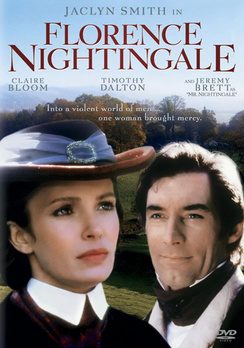
FLORENCE NIGHTINGALE
US, 1985, 180 minutes, Colour.
Jaclyn Smith, Claire Bloom, Timothy Dalton, Timothy West, Peter McEnery?, Brian Cox, Jeremy Brett.
Directed by Daryl Duke,
Florence Nightingale is a long, telemovie tribute to the 19th century woman who reformed nursing, especially in the context of war. There has been a previous film on Florence Nightingale, The Lady With The Lamp, with Anna Neagle directed by her husband Herbert Wilcox.
This film is in the '80s mini-series style. It was filmed in England and on location with a principally English cast. Jaclyn Smith (one of the original Charlie's Angels) gives a creditable performance in the central role, even though the casting is unusual. The supporting cast includes Timothy Dalton, Claire Bloom and Jeremy Brett.
The film establishes Florence Nightingale in the context of Britain in the 1840s and 1850s. It highlights the Dickensian background of the poor, the wealth of the lifestyle of the rich. It is also critical of the British Army and British Empire policy, especially in the context of mismanagement in the Crimea and the lack of humanity in concern for the ordinary wounded soldiers. The film re-creates aspects of the battles in the Crimea, especially with the hospitals.
The film is an entertaining look at a British heroine at the central years of her career and impact on British life. Direction is by American Daryl Duke, director of a number of effective telemovies including The Face of Rage. He also directed The Thorn Birds.
1.Entertaining portrait of Florence Nightingale? In her period? England? The Crimean War? The aftermath of her influence on nursing?
2.Telemovie production, designed for the home audience? The English location settings and photography? Period costume and decor? England and society? The Crimea and the hospitals? The aftermath of battles? Musical score? Editing and pace?
3.The title and the focus on Florence Nightingale? A portrait? How realistic, romanticised?
4.The casting of Jaclyn Smith as Florence Nightingale, how effective? American style - English presence and accent? A vivacious young woman, in the context of her family, in her talent for nursing? In relationships, especially with Richard? Her sense of vocation and her explanation, the voice from God when she was 17? The proposal, her turning Richard down? The demands of her profession, the sacrifice and the consequences? Her nursing in London, success? Her family's approval - yet critical? Being introduced to Sidney Herbert, access to parliamentarians? The Crimean War? Her insight that something had to be done about nursing, her argument with Sidney Herbert, her persuasiveness? Getting the support of the British public? The range of interviews with potential nurses, especially Nurse Davis and her critical attitude? The farewell from her family? The letter from Richard? The journey to the Crimea? Her help, financial resources, supplies? The interview with Dr Menzies and his hostility, the traditions of the male British army? The superintendent and his refusal to allow the nurses to work? Going to the wards, seeing the wounded soldiers? The filthy conditions? The decision to scrub the wards? The nurses becoming restive and wanting to work? The gradual demands made on the women? Their nursing? Dr Menzies and the emergencies with the thousand wounded? Dr Sutherland and the examination of the health conditions, the sewerage and the foul air from the decaying horses? The influence of Florence over Dr Menzies? His final tribute to her? Work, rivalry of Nurse Davis? Her taking a strong stance? The friendship with John, the meal? The letter from Richard and the news of his marriage? Her collapse, illness, Nurse Davis and the others tending her, the cutting of her hair, the recovery? The tribute to her from Queen Victoria, the Victoria Cross? Russell and the London Times, the critique of the government, the tribute to Florence Nightingale and making her a national heroine? Her continued work, the final vindication by the visit of Lord Raglan, the commendations, her being put in command? Her clashes with the superintendent, becoming superior to him? The end of the war, her slipping back home silently? The enigma of her long later life? Her contribution to nursing? Her health and her psychosomatic illnesses making her isolated? The film as a tribute to her?
5.The background of her family, social, her mother's position, her father's support of her, the squabbles in the family? Her vivacity, the dance? Possibility of engagement? Meeting Richard, in love with him, explaining her vocation? The family and their acceptance of her call? Welcoming her back?
6.Richard, in love with her, his social position, politics, proposals, disappointment, farewell letter and tribute, the letter about his marriage?
7.Sidney Herbert, political status, concern about the army, supportive of Florence?
8.Dr Menzies, the doctors of the British Army, the officers? Their hostility towards the women? The superintendent and his claiming the long traditions? His gung-ho attitudes? Ordering amputations, being satisfied with filthy conditions, wanting the men to be heroes?
9.The contrast with the ordinary soldiers, the wounds, the suffering, lack of hygiene, crowding? Unhealthy hospitals?
10.Russell and the journalist from the London Times, observations, articles, support of Florence?
11.The nurses, their personalities, the range of motivation for going to the Crimea? Nurse Davis and her envy? Her tending Florence in her illness?
12.The film's comment on the British Empire, ambitions, clashes with Russia, travelling to the ends of the earth to fight, provisions, aristocracy within the army, the pampering of the officers, the neglect of the ordinary soldiers?
13.Florence Nightingale and her contribution to nursing conditions, the role of women as nurses, health and hygiene.